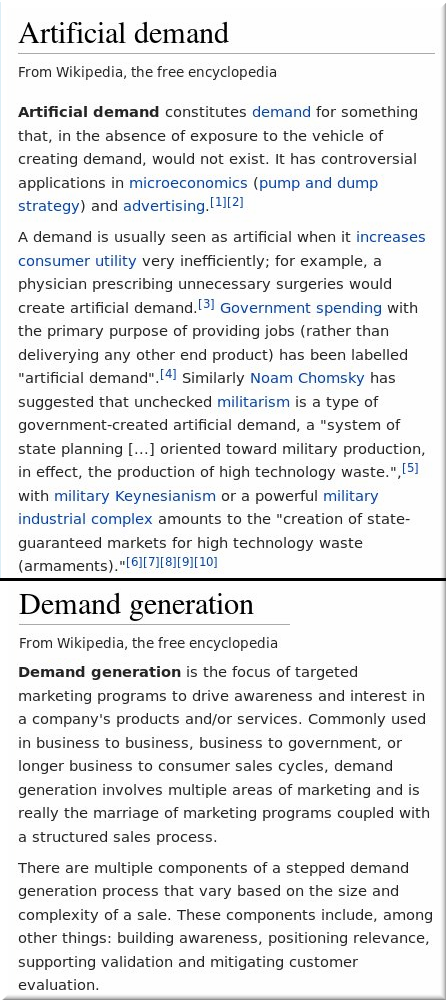

Confer demand generation or artificial demand
OUR previous article, which criticised IAM for meddling in Asian 'IP' policy (despite having no writers at all who are oriental), deals with a broader kind of issue. The media is occupied/dominated by people whose interest (or business model) is not to inform but to promote sponsors' agenda. Here we have IAM's Ellis on Alice, bemoaning what he calls "[a]n increasingly anti-patentee environment in the United States," arguing that it "means that patent monetisation-focused businesses [i.e. patent trolls] are finding life tougher today than in years gone by." Remember that IAM is being paid by patent trolls.
"Consider the fact that the main source of funding to IAM is indeed patent lawyers, or their firms at least (they are also quite likely the subscribers, i.e. those who pay IAM for periodic placements, for overpriced 'magazines', and for bias)."Ellis speaks as though he is a patent lawyer infatuated with software patents, or patent maximalism in general (a growing problem at the USPTO). Consider the fact that the main source of funding to IAM is indeed patent lawyers, or their firms at least (they are also quite likely the subscribers, i.e. those who pay IAM for periodic placements, for overpriced 'magazines', and for bias).
Alice is universally accepted as a good thing, both by software developers and ordinary customers who buy products. It's only patent lawyers and few monopolists like IBM who bemoan Alice. Earlier this month we cited dozens of so-called 'analyses' from all sorts of patent lawyers. They suddenly woke up and made a lot of noise because of one single case. What patent lawyers call "analysis" is usually marketing, in the same way that 'studies' are lobbying (it's selling something, it's not a public service).
Watch how patent lawyers still latch onto one single CAFC case in a desperate effort to revive software patents in the US while the USPTO takes advantage of the situation as well (see Michael Best & Friedrich LLP's 'article' also). The most vocal propaganda site of software patents wants to push Congress towards abolishing Alice altogether, as one might expect. It's clear that SCOTUS won’t be changing its ruling (on Alice or any case like it) any time soon (based on lists of upcoming cases), so the patent lawyers are in panic mode and they bombard the media with articles about TLI Communications (latest examples are in [1, 2]) and Enfish (this new one is from Mark Patrick of Sheppard Mullin Richter & Hampton LLP).
"They're distorting the record in order to help them sell their 'services'."Where are software developers in all this? Patent lawyers are cherry-picking cases for software patents lobbying again (see "Good News for Software Patents?") and Fox Rothschild LLP is trying to salvage software patent in the US (because they're still dying) using this fine art of cherry-picking. So did Finnegan, Henderson, Farabow, Garrett & Dunner LLP. We are seeing such lobbying/marketing several times per day now, even weeks after the CAFC rulings. It drowns out any meaningless/objective analyses. Consider this 'analysis' titled "Federal Circuit Finds Claims Valid Under ۤ 101 For Only The Second Time in Almost Two Years" (2 among so many more, but they only measure the fraction of the glass that's full).
To use another example of cherry-picking, see this new coverage regarding 35 U.S.C. €§ 101. It says: "The magistrate judge recommended denying defendant's motion to dismiss the asserted claims of plaintiff’s patents for categorizing summarized information for lack of patentable subject matter because defendant failed to establish that the claims were directed toward an abstract idea."
"It's often called bias by omission."In summary, we are still finding lots of software patents propaganda from patent law firms that occupy the media. They're distorting the record in order to help them sell their 'services'. One may easily be lured into the illusion or fantasy that software patents are alive and well, probably because there's about 100 times more coverage of cases where courts accept a software patent. It's often called bias by omission. ⬆